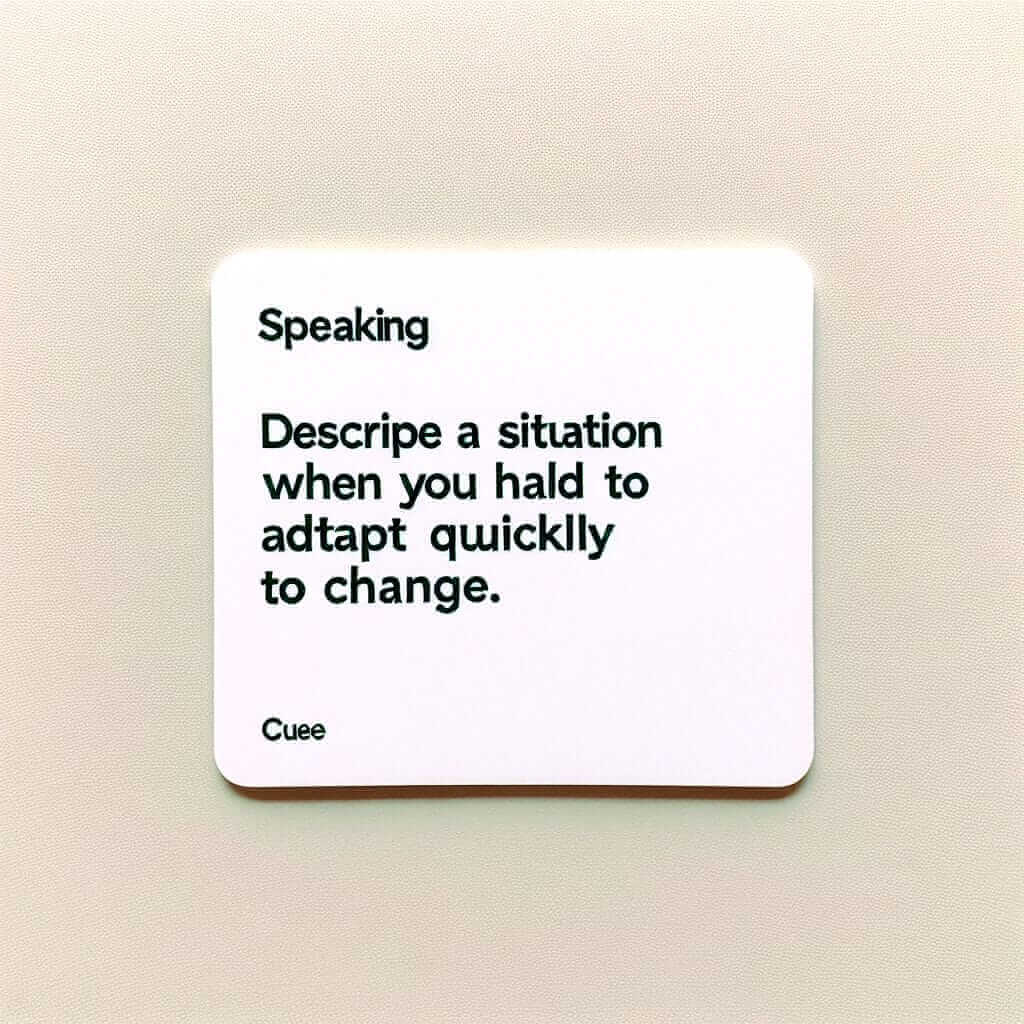The IELTS Speaking test assesses a candidate’s ability to communicate effectively in English. Examiners evaluate based on Fluency and Coherence, Lexical Resource, Grammatical Range and Accuracy, and Pronunciation. It’s crucial to be articulate, confident, and coherent while using a wide range of vocabulary and grammar structures accurately.
One common topic that may arise is “Describe a situation when you had to adapt quickly to change.” This practical, real-life question assesses your storytelling ability and how you handle unexpected situations.
Common Part 1 Questions
Here are some typical questions examiners may ask in Part 1:
- What do you do when you need to relax?
- Do you prefer reading books or watching movies?
- Can you tell me about your hometown?
Let’s see an exemplary answer for one of these questions:
Question: What do you do when you need to relax?
Answer:
“When I need to relax, I usually read a book or listen to some classical music. Reading helps me escape into different worlds and forget about the stresses of daily life. On the other hand, music, particularly classical, is incredibly soothing. It helps me to unwind and clear my mind. Depending on how much time I have, I sometimes indulge in a yoga session, which is excellent for both my body and mind.”
Part 2: Long Turn
Cue Card
Describe a situation when you had to adapt quickly to change. You should say:
- what the situation was
- why the situation needed a quick adaptation
- how you adapted to the change
- and explain how you felt about the situation.
Model Answer
Answer:
_”I vividly remember a time when I had to adapt quickly to a significant change at work. Last year, our team was working on a critical project when our project manager suddenly fell ill. The responsibility of leading the team fell abruptly on me, as I was the assistant team lead. The success of the project was vital for the company’s growth, and we had a tight deadline to meet.
Given the urgency, I had to quickly adapt and assume the project manager’s duties. Firstly, I communicated with the team to reassess our progress and reallocate tasks efficiently. I relied heavily on effective communication and collaborative effort to ensure everyone was aligned with the new plan. I also organized daily meetings to monitor our progress and address any issues promptly.
Though it was challenging, I felt proud of how well we handled the situation. I learned the importance of flexibility and proactive problem-solving. Adapting quickly not only helped us meet the deadline but also strengthened our team dynamics.”_
Follow-Up Questions
-
How did your team react to the sudden change?
- “The team was initially shocked, but they quickly bounced back and were supportive and cooperative, which made the transition smoother.”
-
What qualities are essential to adapt quickly to changes?
- “Being open-minded, flexible, and having good problem-solving skills are critical. Additionally, effective communication and teamwork play a significant role.”
Part 3: Two-Way Discussion
Discussion Questions and Model Answers
Examiner: In your opinion, how important is it for people to adapt to changes quickly?
Candidate:
“Adapting quickly to changes is hugely important in today’s fast-paced world. The ability to adapt ensures that individuals and organizations can stay competitive and relevant. It also enables personal growth and the development of new skills. In my experience, those who adapt swiftly are often more resilient and better equipped to handle unforeseen challenges.”
Examiner: What are some common changes people have to adapt to in their careers?
Candidate:
“In careers, people often have to adapt to technological advancements, shifts in industry trends, and organizational changes. For example, the sudden shift to remote work during the pandemic required employees to quickly embrace new tools and ways of working. Additionally, adapting to new roles or leadership changes requires significant flexibility and openness to learn and grow.”
Useful Vocabulary and Structures
Key Vocabulary
Here are some words and phrases that will enhance your answer:
-
Adapt (/əˈdæpt/): to adjust or modify fittingly.
- “He quickly adapted to the new environment.”
-
Flexibility (/ˌflɛksəˈbɪlɪti/): the quality of bending easily without breaking.
- “Flexibility in thinking is key to management.”
-
Proactive (/prəʊˈæktɪv/): creating or controlling a situation by causing something to happen rather than responding to it after it has happened.
- “We should be proactive in identifying potential problems.”
-
Collaborative (/kəˈlæbəˌreɪtɪv/): produced or conducted by two or more parties working together.
- “We achieved our goal through a collaborative effort.”
Sentence Structures
-
Cleft Sentences: Useful for emphasizing a point.
- “It was the tight deadline that pushed us to adapt quickly.”
-
Use of Conditionals:
- “If I hadn’t adapted quickly, we wouldn’t have met the project deadline.”
-
Complex Sentences:
- “Despite the initial challenges, we managed to reallocate tasks efficiently, ensuring the project’s success.”
Tips for IELTS Speaking Success
- Practice regularly: Engage in English conversations daily to build fluency.
- Use varied vocabulary: Avoid repetitive words; use synonyms and complex phrases.
- Stay calm: Take a deep breath if you feel nervous and focus on articulating your thoughts clearly.
- Be coherent: Ensure your answers have a logical flow and structure.
- Provide examples: Support your answers with real-life examples.
Remember, practice and preparation are key to achieving a high score in the IELTS Speaking test. Good luck!

By focusing on these strategies and utilizing the example answers provided, you’ll be well on your way to mastering the IELTS Speaking test.
For further reading, check out these related topics: